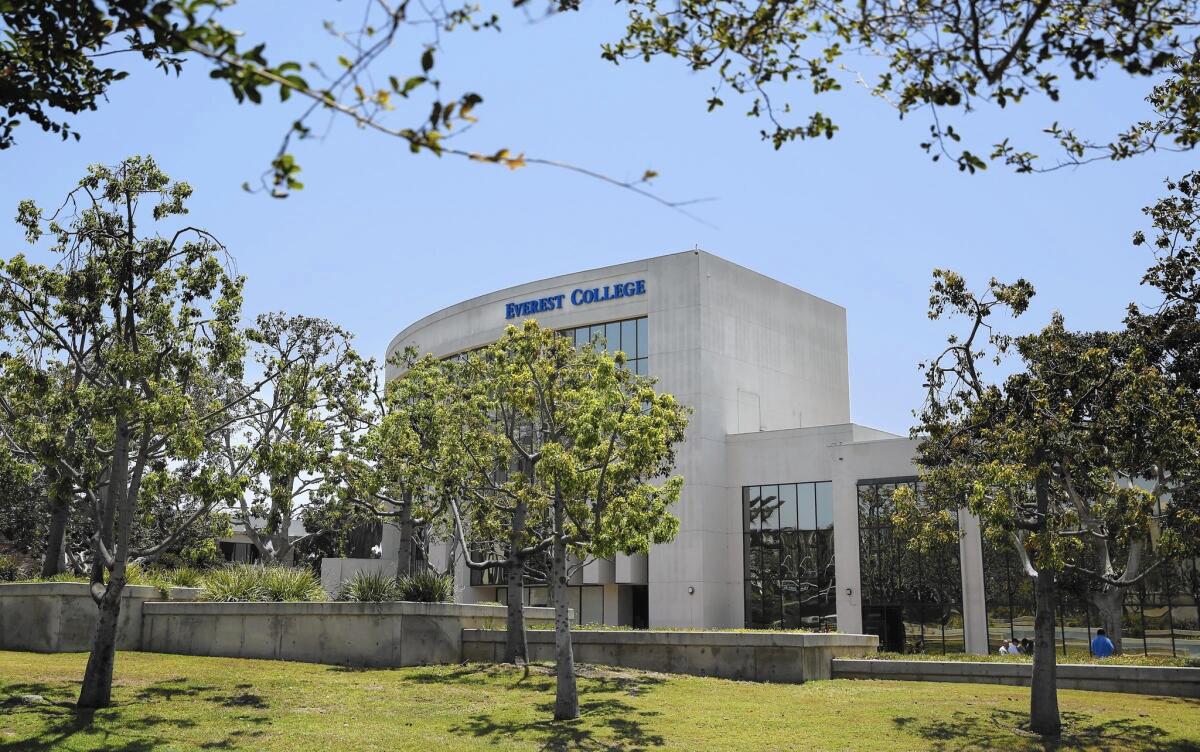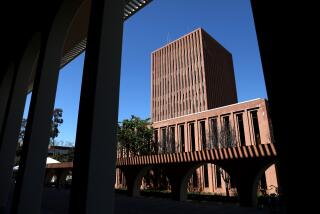Corinthian Colleges again runs afoul of Nasdaq listing rules

In the latest sign of trouble for Orange County-based Corinthian Colleges Inc., the for-profit college operator said Wednesday it is not in compliance with Nasdaq rules after failing to file financial reports for the last two quarters.
Corinthian said it received a warning from Nasdaq last week — the second in two months — and has until Nov. 28 to submit a plan for getting back on track. If the company does not correct its financial reporting problems, it could eventually be delisted from the stock exchange, according to Nasdaq rules.
Santa Ana-based Corinthian has been in serious financial distress since the U.S. Department of Education temporarily suspended its access to federal student aid in June, amid concerns that the company had falsified student job-placement rates and other academic data. As part of a settlement with the department in July, Corinthian agreed to sell off 85 of its 107 campuses and online programs in exchange for temporary cash infusions to keep the company afloat.
A Corinthian news release Wednesday said the ongoing oversight from the Department of Education has put “significant constraints on the company’s resources,” preventing it from completing the most recent financial reports.
“The company could not eliminate the delay without unreasonable effort and expense,” according to the release. Corinthian has not yet decided what to do about the compliance issue.
A company spokesman, Kent Jenkins, declined to comment beyond the release.
The warning from Nasdaq caps a tumultuous year for Corinthian, a company that five years ago had record profits and more than 110,000 students across 25 states.
In March, the company had fewer than 75,000 students, a more than 13% decline from a year earlier.
Analysts who follow Corinthian said it is not surprising that the company hasn’t filed quarterly reports with the Securities and Exchange Commission. The company has essentially been run by the Department of Education since July, they said.
“It would require a fair amount of cost, and really what is the point?” said Michael Tarkan, a research analyst with Compass Point who follows the for-profit education sector. “Does it make sense for them to go out and get these filings in order, when this company is going to look very different if it sells itself?”
In a securities filing last week, Corinthian said the ongoing process of selling off campuses makes it difficult to get an accurate picture of company finances. The company expects “substantial deterioration” of revenue compared with last year.
Corinthian received a similar Nasdaq notice last month, after failing to file an annual financial report covering operations through the end of June. It was also warned in July, after its stock price had closed below $1 for 30 consecutive business days.
The company’s stock price has hovered below 20 cents since the agreement to sell off schools in July. A decade ago, Corinthian’s stock price was above $35 per share.
Nasdaq rules allow for a series of appeals before a company’s stock is delisted, but filing timely financial statements is an essential part of remaining on the stock exchange.
Corinthian’s financial woes have dovetailed with increased scrutiny from state and federal authorities.
The U.S. Consumer Financial Protection Bureau filed suit against the school in September, alleging a “predatory lending” scheme in which Corinthian enrolled students in high-risk, high-interest private loans. Nearly 60% of the borrowers defaulted on the loans within three years, according to the suit.
Corinthian denies the allegations.
In August, the company also said it had received a grand jury subpoena from the U.S. attorney’s office in Los Angeles. And it remains under investigation by more than a dozen state attorneys general, including California Atty. Gen. Kamala Harris, over its financial aid, recruiting and job-placement practices.
Corinthian has not disclosed how many schools it has sold since July, but the company said in a recent filing that the outcome of potential sales is “uncertain.”
Outside analysts expect that Corinthian will eventually file for bankruptcy, but such a move would prevent the company from accessing federal student loans and grants — the source of virtually all company revenue.
Bradley Safalow of PAA Research, an investment firm, said he expects the company to remain in limbo until it sells off more schools — or runs out of money.
“Within the next few months, they know they will not be an ongoing entity,” Safalow said. “They are insolvent. It’s just a question of whether the federal government can transition these schools to other entities or ownerships.”
Twitter: @c_kirkham
More to Read
Inside the business of entertainment
The Wide Shot brings you news, analysis and insights on everything from streaming wars to production — and what it all means for the future.
You may occasionally receive promotional content from the Los Angeles Times.











